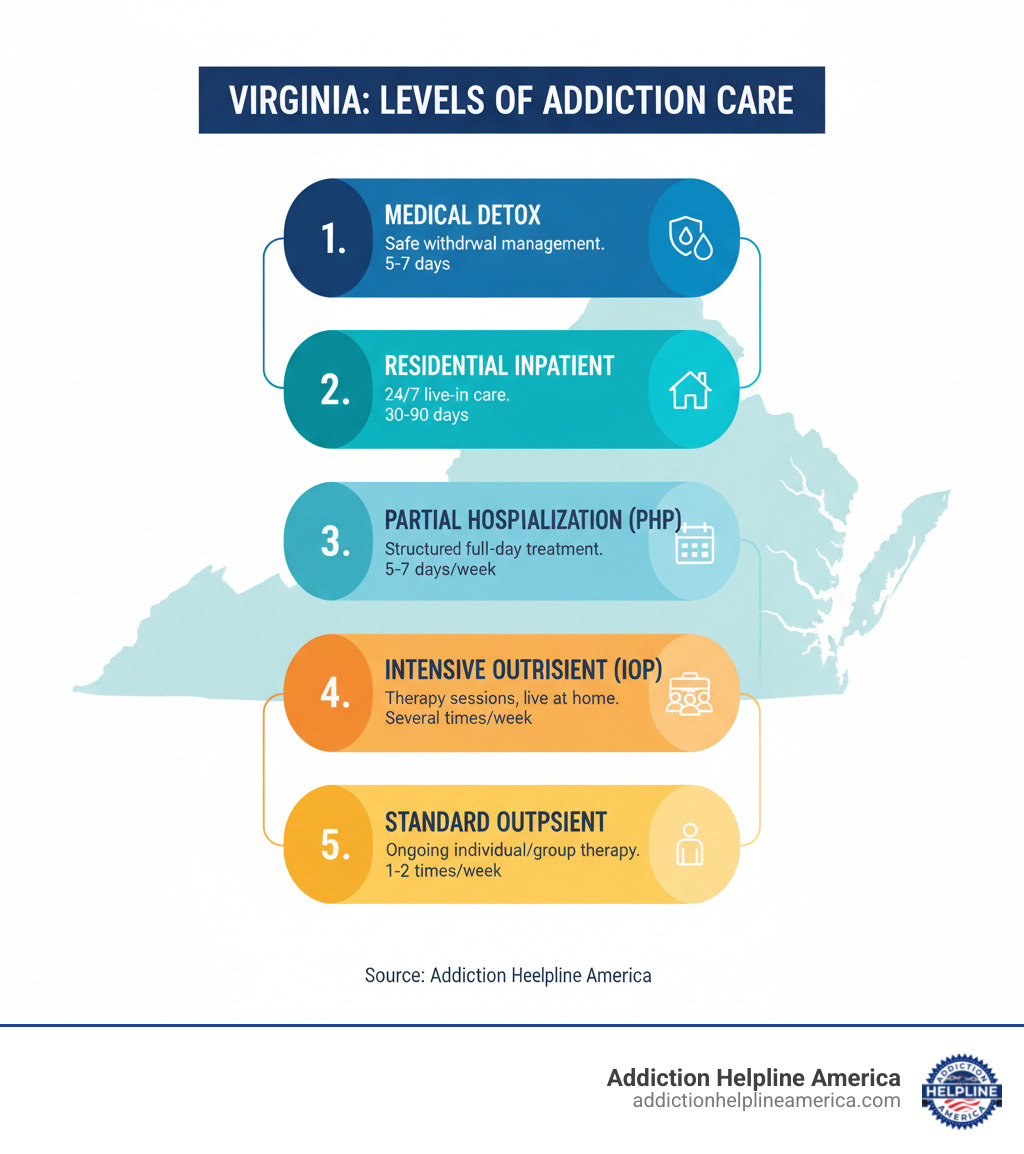
Understanding Drug Rehab Options in Virginia
Drug rehab in Virginia provides a wide range of treatment options for substance use disorders. With nearly 500,000 Virginians affected by addiction in recent years and opioids driving over 76% of fatal overdoses in 2021, finding the right help is critical but can feel overwhelming.
Quick Guide to Virginia Drug Rehab:
- 249 treatment facilities operate across Virginia, offering various levels of care
- Treatment types include detox, residential inpatient, partial hospitalization (PHP), intensive outpatient (IOP), and standard outpatient programs
- Cost coverage: 84% accept private insurance, 80% accept Medicaid, and 33% offer no-cost or minimal-cost options
- Specialized programs available for veterans, teens, young adults, and those with co-occurring mental health disorders
- Entry points: 40 Community Services Boards (CSBs) provide access to public behavioral health services
Navigating the complex landscape of treatment options to find the best fit for your unique situation is a major challenge. While Virginia has expanded treatment services in response to the opioid crisis, more options can make the choice harder.
This guide reviews top-rated drug rehab facilities in Virginia, explaining what makes each unique, the treatments they offer, and how to access them. We’ll clarify the differences between levels of care, define evidence-based therapies, and explain how to verify insurance coverage.
At Addiction Helpline America, we provide confidential guidance to help you find a treatment program in Virginia that matches your specific needs. Our experience has taught us which factors matter most when choosing a path to recovery.
The State of Addiction and Recovery in Virginia
Virginia is facing a significant addiction crisis. In 2021, the state lost 2,226 people to drug overdose deaths—more than six people every day. Behind each statistic is a person who struggled with addiction.
The numbers are sobering: Opioids were involved in 76% of fatal overdoses, with the synthetic opioid fentanyl driving this trend. Fentanyl is up to 50 times stronger than heroin and is often mixed into other drugs unknowingly. The crisis was fueled by high opioid prescription rates, which led many to turn to street drugs now contaminated with fentanyl.
More than 150,000 adults in Virginia needed treatment for substance use disorder in the past year, according to the Substance Abuse and Mental Health Services Administration (SAMHSA). These are our neighbors, coworkers, and loved ones struggling with a chronic illness that requires professional care.
Fortunately, Virginia has built a strong support system to combat this crisis.
The Virginia Department of Behavioral Health and Developmental Services oversees facilities to ensure they meet quality and safety standards, complemented by national guidelines from SAMHSA. This oversight ensures that a drug rehab in Virginia provides safe, effective care.
For those without private insurance, Virginia’s Medicaid program (Cardinal Care) offers the Addiction and Recovery Treatment Services (ARTS) benefit. Launched in 2017, ARTS provides comprehensive addiction treatment, including medical detox and residential care, to eligible members, helping thousands access care.
The state continues working to expand these services. The Department of Medical Assistance Services (DMAS) is planning to submit its 1115 waiver renewal application to further strengthen coverage and create a healthier Virginia for everyone.
Across the state, 40 Community Services Boards (CSBs) act as local entry points for behavioral health services. They are crucial for connecting people to care, especially those needing reduced-cost options or living in rural areas.
The message is clear: help is available, and recovery is possible. Whether you have private insurance, Medicaid, or need other options, there are pathways to treatment.
Key Factors in Choosing a Quality Drug Rehab in Virginia
Choosing the right drug rehab in Virginia means finding a program that understands addiction as a complex illness and provides proven, compassionate care for your specific needs. It’s about finding a professional team committed to your success.
A quality facility offers a continuum of care, meaning it provides different levels of treatment that adapt to your changing needs. This flexibility is crucial, as recovery is not a linear process. A full continuum includes: Medical Detox for safe withdrawal, Residential Inpatient for 24/7 support, Partial Hospitalization (PHP) for intensive day treatment, Intensive Outpatient (IOP) for flexible weekly sessions, and standard Outpatient programs for long-term maintenance.
The therapies used are as important as the program structure. Look for facilities using evidence-based therapies—methods proven by scientific research. Key examples include Cognitive-Behavioral Therapy (CBT), which changes negative thought patterns, and Dialectical Behavior Therapy (DBT), which teaches emotional regulation and distress tolerance. Trauma-Informed Care is also vital, as it addresses underlying trauma that often co-exists with addiction.
Accreditation and Licensing are key indicators of quality and safety. Accreditations from organizations like The Joint Commission and CARF signify that a facility meets high standards for patient care and ethical practices. State-level licensing from the Virginia Department of Behavioral Health and Developmental Services ensures compliance with Virginia’s specific requirements.
A facility must create individualized treatment plans. Your history, mental health, and goals are unique, so your treatment should be too. This is especially important for dual-diagnosis cases, where addiction and a mental health condition occur together. Many Virginia facilities offer specialized care for these co-occurring disorders.
Finally, quality programs provide robust aftercare and alumni support. These services, such as continued therapy and support groups, bridge the gap between structured treatment and independent sobriety, significantly reducing the risk of relapse.
For a deeper look at what’s available across the state, check out our comprehensive guide to Virginia rehab options. Understanding these key factors helps you find not just any program, but the right program for you.
Top Drug and Alcohol Rehab Centers in Virginia
Finding the right drug rehab in Virginia involves matching a facility’s unique strengths to your needs. Virginia has many excellent centers, from luxury facilities to those serving specific populations like veterans or young adults. We’ve reviewed several standout options to highlight the different approaches to recovery available across the state.
Arrowwood Addiction Treatment Center: Luxury and Comfort
Arrowwood Addiction Treatment Center focuses on providing a healing environment of comfort and peace. Their modern facility and cutting-edge amenities create a serene space for recovery. Arrowwood combines this luxury with clinical excellence, offering medically supervised detoxification to ensure a safe and comfortable withdrawal process. By removing physical discomfort and environmental distractions, clients can better engage in therapy. Their residential inpatient program is built on personalized treatment plans using evidence-based treatment like Cognitive Behavioral Therapy. Arrowwood also provides aftercare and alumni support, reinforcing their commitment to long-term sobriety.
The Farley Center: Specialized Care for Veterans
For over 30 years, The Farley Center in Williamsburg has been a trusted name in Virginia, with a particular strength in serving veterans. As a certified member of the Community Care Network, Farley specializes in treating the unique challenges faced by military personnel, including service-related trauma. Their programs are built around the specific needs of the military community. Comprehensive services include evaluation, medical detox, and outpatient programs, with a team of on-site physicians providing personalized medical care. The Farley Center holds CARF accreditation for multiple levels of care and fosters a supportive community through alumni events.
Novara Recovery Center: An Integrative Approach
Located in Fairfax, Novara Recovery Center uses a client-first, integrative approach to addiction medicine, treating the whole person. Novara excels at dual-diagnosis programming, simultaneously treating addiction and co-occurring mental health conditions like depression or anxiety. A key feature is their use of holistic therapies—such as yoga, art, and music therapy—alongside evidence-based treatments like CBT and DBT. This model addresses healing on multiple levels. Their modern facilities were designed to inspire hope and comfort. Novara offers a full spectrum of care, from detox and residential treatment to various outpatient programs, allowing for a smooth transition through recovery stages.
Sandstone Care: Age-Specific Programs
Sandstone Care’s approach is built on age-specific tracks for teens (13-17), young adults (18-30), and adults, recognizing that each group has different developmental and social needs. A key component is family involvement, with bi-weekly family therapy and multi-family support groups to heal the entire family system. Sandstone also provides academic and vocational support to help younger clients stay on track with school or career goals. With multiple locations across Virginia, they offer medical detox (Fairfax County) and various outpatient levels. For young adults, a transitional living program in Reston provides a supportive environment for practicing independence. You can find directions to a local center to see which location is best.
Safe Harbor Recovery Center: A Focus on Lifelong Sobriety
Safe Harbor Recovery Center, with locations in Portsmouth and Chesapeake, operates on the principle that addiction is a chronic illness requiring ongoing care. Their philosophy is to dig deeper into the underlying causes of addiction, not just the immediate crisis. This shapes their comprehensive continuum of care, which includes medically supervised detox, residential treatment, and multiple outpatient levels. Therapeutic approaches focus on individual and group counseling and relapse prevention planning. Safe Harbor emphasizes lifelong recovery through its active alumni support groups, creating an ongoing community for encouragement and accountability. Their commitment to quality is demonstrated by their accreditation from The Joint Commission.
Other Notable Drug Rehab in Virginia Options
Virginia’s treatment network is extensive. Here are a few more notable programs:
- Willow Oaks Residential Treatment Cartersville, VA: Offers structured residential care in a therapeutic environment.
- Carilion Saint Albans Hospital Christiansburg, VA: Provides hospital-based medical and psychiatric care, including detox for complex cases.
- Goochland Powhatan Community Services Goochland, VA: A Community Services Board offering access to public behavioral health services.
- Center for Discovery Alexandria Outpatient Alexandria, VA: Specializes in outpatient services for eating disorders and co-occurring conditions.
- Alamo Recovery Center Petersburg, VA: An accessible treatment option in central Virginia.
Navigating these options can be overwhelming. At Addiction Helpline America, we help you find the right program for your situation.
Paying for Rehab: Insurance and Financial Options
The cost of drug rehab in Virginia can feel overwhelming, but the cost of not getting treatment is far greater. Fortunately, there are many ways to afford quality care.
The first step is insurance verification. This is a confidential process that we at Addiction Helpline America can handle for you. We work with your provider to determine what your plan covers, your potential out-of-pocket costs, and which facilities are in-network. This clarity removes a major barrier to getting help.
If you have private insurance, your treatment is likely covered. In Virginia, 84% of facilities accept private insurance. Federal laws like the ACA and MHPAEA mandate that insurers cover substance use disorder treatment. Your PPO or POS plan should include these benefits. We can help you distinguish between in-network (lower cost) and out-of-network providers.
For those without private insurance, Virginia Medicaid (Cardinal Care) is a key resource. The ARTS benefit provides specialized coverage for a full range of addiction services, including detox and residential care. With 80% of Virginia centers accepting Medicaid, it’s a widely available option. The state is also working to expand coverage through its 1115 waiver renewal.
Veterans can access comprehensive care through VA benefits for substance use treatment. Military families and retirees may also have coverage through TRICARE.
Beyond insurance, 95% of Virginia centers accept cash or self-payment. Many also offer sliding scale fees based on income (57% of centers), and 33% provide treatment at little to no cost. Your local Community Services Board (CSB) is an excellent resource for finding these affordable options.
At Addiction Helpline America, we provide free confidential support to help you steer these financial options. We’ll verify your coverage and connect you to a drug rehab in Virginia that fits your needs and budget. You don’t have to do this alone.
Frequently Asked Questions about Virginia Rehab
How long does a typical drug rehab program in Virginia last?
The duration of a drug rehab in Virginia program is custom to your individual needs. There is no one-size-fits-all answer.
Short-term programs typically last about 30 days, often including detox followed by intensive therapy. This can be a strong starting point for those with less severe addictions.
Long-term programs can extend to 60, 90, or more days. These are often recommended for individuals with severe substance use disorders, co-occurring mental health conditions, or a history of relapse. The additional time allows for deeper therapeutic work and skill-building.
The right duration depends on the severity of addiction, substances used, and your mental health. A quality treatment center will conduct a thorough assessment to recommend a length of stay that gives you the best chance at sustained recovery.
What is the first step to getting help for addiction in Virginia?
The first step is acknowledging you need help. Once you’ve made that internal decision, the next practical steps are:
- Reach Out. This is the most crucial action. Call a trusted person, your doctor, or a confidential helpline. At Addiction Helpline America, our team is available to provide free, confidential guidance and support you in figuring out what’s next.
- Undergo an Assessment. After making contact, you’ll speak with a clinician for an assessment. This is a conversation to understand your history, health, and recovery goals. It helps determine the appropriate level of care for you (e.g., detox, residential, outpatient).
- Verify Insurance. This process clarifies what your insurance plan covers and what your out-of-pocket costs might be. Most treatment centers, and our helpline, can manage this for you, making the path to treatment clearer and more achievable.
You don’t have to have all the answers before you call. The first step is simply asking for help.
What kind of support is available after completing a rehab program?
Completing a rehab program is a major achievement, but recovery is an ongoing process. Robust aftercare is essential for long-term success. Key support options in Virginia include:
- Aftercare Planning: Before you leave treatment, you’ll work with your team to create a personalized plan. This roadmap outlines strategies for handling triggers and identifies resources for continued support.
- Sober Living Homes: These substance-free residences provide a structured, supportive environment to transition from inpatient care back to daily life. They offer accountability and peer support.
- Alumni Programs: Many treatment centers, like those mentioned in this guide, have active alumni programs. These offer a powerful sense of community through events, meetings, and peer connection.
- Support Groups: Groups like Alcoholics Anonymous (AA) and Narcotics Anonymous (NA) are free, anonymous, and widely available across Virginia. They provide invaluable peer fellowship.
- Ongoing Therapy: Continuing with individual or group counseling provides professional guidance as you steer the challenges of long-term recovery.
Conclusion: Your Path to Recovery Starts Today
If you’re reading this, you’ve already taken a courageous step by seeking information and considering change. While addiction statistics in Virginia are sobering, they don’t tell the whole story. Behind every number is a person with the potential for healing. Recovery is possible, and Virginia has many quality treatment options to support you.
From Arrowwood’s comfortable setting to The Farley Center’s veteran-specific care, and from Novara’s integrative methods to Sandstone’s age-specific tracks, Virginia offers diverse paths to healing. Each facility shares the goal of helping you reclaim a healthy, substance-free life.
Choosing the right program can feel overwhelming. Questions about the level of care, dual-diagnosis treatment, and insurance are common. Finding the right fit is crucial, as every recovery journey is deeply personalized.
This is where professional guidance helps. At Addiction Helpline America, we provide free, confidential support to help you steer the treatment landscape. We listen to your story, answer your questions, and connect you with an effective drug rehab in Virginia that fits your specific needs.
You don’t have to make this decision alone. Whether for yourself or a loved one, we are ready to help. Your path to recovery can start today. Take the first step and reach out. Let us help you find the best drug rehab in Virginia for your needs, and together, we’ll start building your recovery story.
Our helpline is 100%
free & confidential
If you or someone you care about is struggling with drug or alcohol addiction, we can help you explore your recovery options. Don’t face this challenge alone—seek support from us.
Programs
Resources
Will my insurance
cover addiction
treatment?
We're ready to help
Find the best
drug or alcohol treatment
center
Are you or a loved one struggling with addiction? Call today to speak to a treatment expert.
















